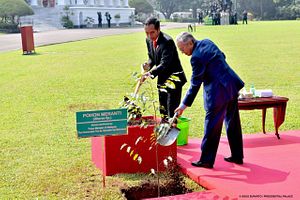Earlier this month, Indonesia and Malaysia held another iteration of their border security meeting. The interaction was just the latest sign of the ongoing effort by the two states to strengthen defense collaboration between them to manage and address existing shared challenges they face regarding their borders as well as in their security ties more generally.
As I have pointed out before in these pages, despite some disagreements on the security side that they continue to manage – ranging from illegal fishing to the outstanding Ambalat dispute, Malaysia and Indonesia, the two main Muslim-majority countries in Southeast Asia, do maintain a healthy overall defense relationship.
One way in which security ties are managed is through a series of mechanisms between the two sides. Though there have been a range of more general bilateral forums that are convened regularly, both countries also set up a special forum for the management of border issues called the General Border Committee (GBC Malindo) as well as the High-Level Committee (HLC) that tends to address security issues more specifically and features meetings between the defense establishments.
Earlier this month, both sides held the 41st annual general meeting of the GBC Malindo. The meeting was held in Bali, Indonesia and it followed the last iteration that was held in Kuala Lumpur, Malaysia last year. This iteration of the GBC Malindo was particularly interesting as it represented the first one that came after the shock election victory of Malaysia’s opposition in May that had ousted Najib Razak as premier, and also the last one before Indonesia heads to the polls for a presidential election in 2019 that will see Indonesian President Joko “Jokowi” Widodo up for reelection.
The GBC Malindo meeting was headed by the defense ministers from Malaysia and Indonesia, Mohamad Sabu and Ryamizard Ryacudu respectively. They were each accompanied by representatives across several agencies, including foreign affairs, home affairs, and the various security agencies including the military and the police.
As is usually the case with such meetings, both sides took stock of the progress reports of the various agencies under the GBC, including under various working groups. These included a whole host of issues such a but not limited to drug smuggling, terrorism and violent extremism, and illicit trafficking.
According to Indonesia’s defense ministry (KEMHAN), they also addressed various problems and challenges being faced and potential ways to address and manage them as well. These related not just to tackling remaining issues with border management, but ways to tackle root causes including the promotion of economic development and greater security for people on both sides.
Predictably, both sides did not disclose any specifics on what exactly they had planned to move forward with for future activities and meetings given the sensitivities around the issues involved. Nonetheless, as defense cooperation continues to shape up for the rest of 2018 and into 2019 as well, the management of border issues between the two sides will continue to be an aspect of that which will be notable to watch.
































